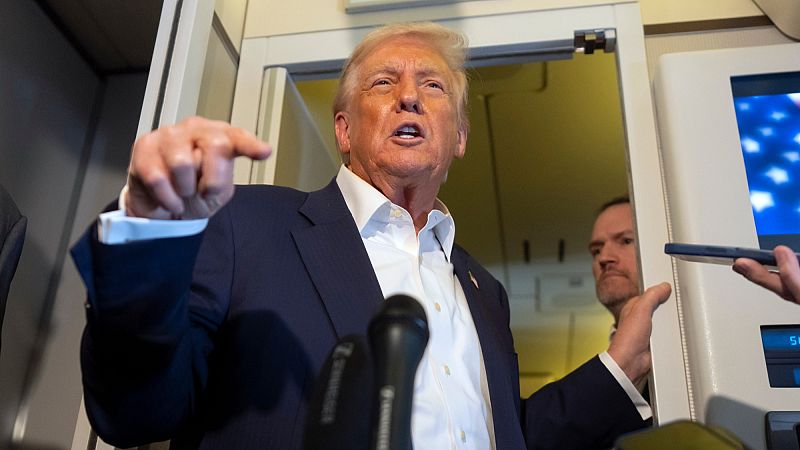Trump urges Putin to end war in Ukraine ‘instead of testing missiles’

Following the news of Moscow's successful test of its Burevestnik nuclear-ready missile, US President Donald Trump urged his Russian counterpart Vladimir Putin to focus on ending the war against Ukraine rather than “testing missiles”.
“He (Putin) should get the war ended. A war that should have taken a week is now soon in its fourth year. That's what he should do instead of testing missiles", Trump said on Monday onboard Air Force One.
Putin said on Sunday that Russia successfully tested its “unique” cruise missile, which the Kremlin described as part of efforts to “ensure the country’s national security”.
Together with Russia’s nuclear drills last week, the Burevestnik test is widely seen as a further message to Washington, following Putin's words last week, when he stated Moscow will not cave under US sanctions and pressure.
Trump has called the missile test announcement “not appropriate”, noting also that Moscow is aware that the US has a nuclear submarine deployed "right off their shore".
"They're not playing games with us, we're not playing games with them either," Trump said. “We test missiles all the time.”
What do we know about Burevestnik?
Amid the diplomatic fallout with the US and the latest Washington's sanctions against Russia, Putin announced on Sunday that Moscow has “successfully tested” its nuclear-powered Burevestnik cruise missile, “a unique product that no one else in the world possesses”.
Russian Chief of General Staff Valery Gerasimov said that the test launch lasted for 15 hours and covered a 14,000-kilometre distance, which is “not the limit".
During the test, the weapon demonstrated “its high capabilities in evading anti-missile and anti-aircraft defences,” Gerasimov said.
John Hardie, deputy director of the Russia Program at the Foundation for Defence of Democracies, told Euronews that Burevestnik’s nuclear propulsion ”is supposed to allow for virtually unlimited range”.
“Moscow presents the missile as one of the ways it intends to ensure it can penetrate US defences during a potential nuclear exchange," Hardie explained.
However, Hardie said he remained sceptical about the new Russian missile. “Personally, I view Burevestnik as an unnecessary boondoggle, consuming resources the Russian military would be better off devoting to other areas," he explained.
Hardie also pointed out that the timing of the test, reportedly held last Tuesday — the day before Moscow announced their Grom or "Thunder" nuclear exercise — suggested that the test was “probably scheduled before the new US sanctions were announced”.
“Moscow may hope the purportedly successful test will add weight to Putin's proposal to extend the limits of the expiring New START treaty," he said.
"That proposal is likely aimed partly at redirecting US attention toward arms control talks with Moscow in the hope that will make President Trump more amenable to Kremlin peace terms in Ukraine.”
The new START Treaty between the US and Russia limits all Russian deployed intercontinental-range nuclear weapons, including every Russian nuclear warhead that is loaded onto an intercontinental-range ballistic missile that can reach the US in approximately 30 minutes.
The treaty's original duration of 10 years — expiring on 5 February 2021 — included the option for the parties to agree to extend it for up to five additional years.
The United States and the Russian Federation agreed to a five-year extension of New START, keeping it in force through 4 February 2026.
Today

